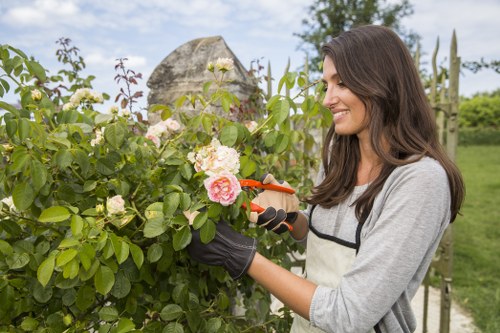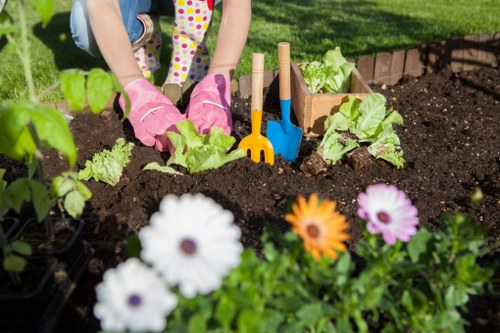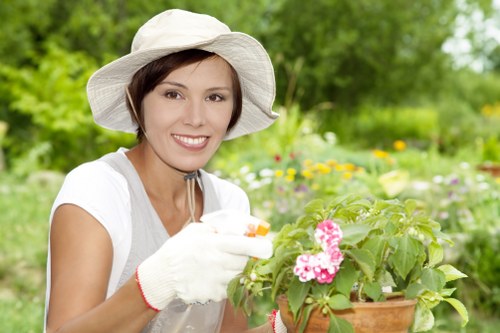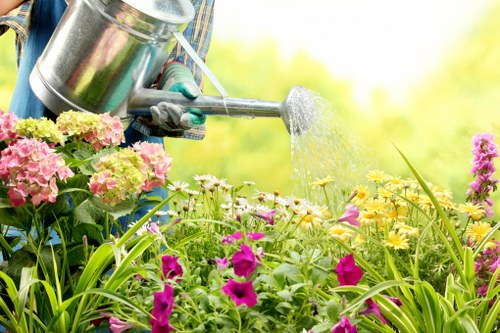Comprehensive Guide to Garden Maintenance in Queens Park
Introduction to Garden Maintenance

Maintaining a beautiful garden in Queens Park requires a blend of passion, knowledge, and regular upkeep. Whether you're a seasoned gardener or a newbie, understanding the essentials of garden maintenance can transform your outdoor space into a vibrant oasis. This guide covers everything you need to know to keep your garden thriving all year round.
Queens Park, known for its lush greenery and diverse plant life, offers a unique environment for gardening enthusiasts. The climate, soil conditions, and local flora play significant roles in determining the best maintenance practices for your garden.
In this article, we will explore various aspects of garden maintenance, from seasonal tasks to pest control, ensuring your garden remains healthy and aesthetically pleasing.
Seasonal Garden Maintenance

Spring Maintenance
Spring is the perfect time to start revitalizing your garden after the winter months. Begin by clearing out any debris and dead plants that may have accumulated. This sets the stage for new growth and prevents the spread of diseases.
Key tasks in spring include:
- Soil preparation: Test the soil pH and amend it if necessary to provide optimal conditions for plant growth.
- Planting: Introduce new plants, flowers, and shrubs suited to Queens Park’s climate.
- Pruning: Trim back any overgrown branches or stems to encourage healthy growth.
Summer Care
During the summer, gardens require consistent attention to handle the heat and ensure plants receive adequate water. Mulching can help retain soil moisture and regulate temperature, reducing the need for frequent watering.
Summer maintenance tips:
- Watering: Water early in the morning or late in the evening to minimize evaporation.
- Pest control: Keep an eye out for common pests and address infestations promptly.
- Weeding: Regularly remove weeds to prevent them from competing with your plants for nutrients.
Autumn Preparation
As the seasons change, it’s essential to prepare your garden for the cooler months. This involves cleaning up fallen leaves and dead plant material to prevent fungal diseases and pests from taking hold.
Autumn tasks include:
- Plant protection: Protect sensitive plants from frost by adding mulch or using protective covers.
- Composting: Begin composting organic matter to enrich the soil for the next growing season.
- Tool maintenance: Clean and store garden tools properly to extend their lifespan.
Winter Care
Winter in Queens Park can be harsh on gardens, making it crucial to implement protective measures. Focus on safeguarding perennial plants and preparing the soil for spring.
Winter maintenance strategies:
- Mulching: Apply a layer of mulch to insulate plant roots against freezing temperatures.
- Garden cleaning: Remove any remaining plant debris to reduce the risk of pests and diseases.
- Planning: Use the winter months to plan and design your garden layout for the upcoming year.
Essential Garden Maintenance Tasks

Weed Control
Weeds compete with your plants for essential nutrients, water, and sunlight, making their control a critical aspect of garden maintenance. Regular weeding not only keeps your garden looking tidy but also ensures the health and vitality of your plants.
Effective weed control methods:
- Manual removal: Regularly pull weeds by hand to prevent them from taking root.
- Mulching: Apply mulch around plants to suppress weed growth.
- Natural herbicides: Use eco-friendly herbicides to manage persistent weeds without harming the environment.
Pruning and Trimming
Pruning is essential for maintaining the shape and health of your plants. It encourages new growth, removes dead or diseased branches, and promotes better air circulation, reducing the risk of fungal infections.
Pruning tips:
- Use the right tools: Ensure your pruning tools are sharp and clean to make precise cuts.
- Prune at the right time: Different plants have specific pruning seasons; research the best time for each type.
- Cut strategically: Remove only the necessary branches to avoid stressing the plant.
Watering Practices
Proper watering is crucial for the health of your garden. Overwatering can lead to root rot, while underwatering can cause plants to wilt and die. Understanding the specific water needs of your plants helps maintain their optimal condition.
Best watering practices:
- Deep watering: Water deeply to encourage strong root growth.
- Consistent schedule: Establish a regular watering schedule based on seasonal requirements.
- Use efficient systems: Implement drip irrigation or soaker hoses to minimize water waste.
Pest and Disease Management

Identifying Common Pests
Pests can cause significant damage to your garden if not managed effectively. Common garden pests in Queens Park include aphids, slugs, and caterpillars. Recognizing the signs of infestation early allows for timely intervention.
Common garden pests:
- Aphids: Small insects that suck sap from plants, causing leaves to curl and yellow.
- Slugs: Mollusks that feed on leaves and stems, leaving behind slime trails.
- Caterpillars: Larvae of butterflies and moths that can defoliate plants rapidly.
Natural Pest Control Methods
Using natural methods to control pests is environmentally friendly and safe for your plants. Implementing these strategies can help maintain a balanced ecosystem in your garden.
Natural pest control options:
- Beneficial insects: Introduce ladybugs and praying mantises to prey on common garden pests.
- Neem oil: Apply neem oil as a natural pesticide to deter unwanted insects.
- Handpicking: Regularly inspect and remove pests manually from your plants.
Disease Prevention and Treatment
Plant diseases can spread quickly, so prevention is key to maintaining a healthy garden. Proper sanitation, adequate spacing, and choosing disease-resistant plant varieties can significantly reduce the risk of infections.
Disease management tips:
- Sanitation: Remove and dispose of any infected plant material immediately.
- Proper spacing: Ensure plants have enough space for air circulation, reducing humidity and the likelihood of fungal growth.
- Resistant varieties: Select plant varieties that are naturally resistant to common diseases in Queens Park.
Soil Health and Fertilization

Understanding Soil Composition
Healthy soil is the foundation of a thriving garden. Understanding the composition and quality of your garden soil helps you make informed decisions about amendments and plant selection. Soil in Queens Park may vary, so testing is essential.
Key soil components:
- Clay: Retains water but can be heavy and compacted.
- Silt: Smooth texture that holds moisture well.
- Sandy: Drains quickly but may lack nutrients.
Soil Testing and Amendments
Regular soil testing provides insights into pH levels and nutrient content, allowing you to amend the soil appropriately. Adding organic matter such as compost or well-rotted manure enhances soil structure and fertility.
Soil amendment tips:
- Add compost: Incorporate compost into the soil to improve texture and nutrient availability.
- Adjust pH: Use lime to raise pH or sulfur to lower it based on soil test results.
- Incorporate mulch: Apply mulch to retain moisture and enrich the soil as it decomposes.
Fertilization Strategies
Fertilizing your garden provides essential nutrients that promote healthy plant growth. Understanding the specific needs of your plants ensures effective fertilization without overdoing it.
Effective fertilization practices:
- Balanced fertilizers: Use fertilizers that offer a balanced mix of nitrogen, phosphorus, and potassium.
- Slow-release options: Opt for slow-release fertilizers to provide a steady supply of nutrients over time.
- Organic fertilizers: Choose organic options like fish emulsion or bone meal for a natural nutrient boost.
Maintaining Soil Health
Consistently maintaining soil health ensures long-term garden success. Practices such as crop rotation, cover cropping, and avoiding soil compaction contribute to a robust and fertile garden environment.
Soil health maintenance tips:
- Crop rotation: Rotate plant families each season to prevent soil depletion and reduce pest buildup.
- Cover crops: Plant cover crops during off-seasons to protect and enrich the soil.
- Avoid compaction: Minimize walking on garden beds to preserve soil structure and aeration.
Plant Selection and Landscaping
Selecting the Right Plants
Choosing the right plants is crucial for a successful garden in Queens Park. Consider factors such as climate, soil type, and sunlight availability when selecting plants. Opting for native species can enhance resilience and reduce maintenance efforts.
Tips for selecting plants:
- Native plants: Native species are adapted to the local climate and pests, making them easier to maintain.
- Diverse selection: Incorporate a variety of plants to create a balanced ecosystem and reduce disease susceptibility.
- Seasonal blooms: Choose plants that offer year-round interest with blooms in different seasons.
Landscape Design Principles
Effective landscape design enhances the beauty and functionality of your garden. Incorporating principles such as balance, contrast, and focal points can create an aesthetically pleasing outdoor space.
Design principles to consider:
- Balance: Distribute plants and features evenly to achieve visual harmony.
- Contrast: Use plants with varying colors, textures, and heights to add depth and interest.
- Focal points: Create centers of interest with features like fountains, sculptures, or striking plant arrangements.
Hardscaping Elements
Incorporating hardscaping elements such as paths, patios, and garden structures adds functionality and structure to your garden. These features not only enhance the aesthetic appeal but also provide practical benefits like easy navigation and designated areas for relaxation.
Popular hardscaping features:
- Stone pathways: Durable and attractive paths that guide visitors through your garden.
- Patios: Outdoor living spaces ideal for entertaining and relaxation.
- Garden structures: Arbors, pergolas, and trellises that support climbing plants and add vertical interest.
Sustainable Gardening Practices
Adopting sustainable practices not only benefits the environment but also promotes a healthy and resilient garden. Techniques such as rainwater harvesting, composting, and using organic products contribute to sustainability.
Sustainable gardening tips:
- Rainwater harvesting: Collect and store rainwater for irrigation to conserve water resources.
- Composting: Recycle organic waste into nutrient-rich compost for soil enrichment.
- Organic gardening: Use organic fertilizers and pest control methods to maintain a chemical-free garden.
Creating Wildlife-Friendly Gardens
A wildlife-friendly garden attracts beneficial insects, birds, and other creatures that contribute to the ecological balance. Providing habitats and food sources encourages natural pest control and enhances biodiversity.
Ways to make your garden wildlife-friendly:
- Bird feeders and houses: Install bird feeders and nesting boxes to attract various bird species.
- Pollinator plants: Grow flowers that attract bees, butterflies, and other pollinators.
- Habitat features: Include elements like ponds, log piles, and native shrubs to provide shelter for wildlife.
Tools and Equipment for Effective Maintenance
Essential Gardening Tools
Having the right tools makes garden maintenance tasks more efficient and enjoyable. Investing in quality tools ensures durability and better performance, making it easier to care for your Queens Park garden.
Must-have gardening tools:
- Hand trowel: Ideal for digging small holes and transplanting seedlings.
- Pruning shears: Essential for trimming and shaping plants with precision.
- Garden fork: Useful for aerating soil and turning compost.
Power Tools and Machinery
For larger gardens, power tools can save time and effort. Equipment such as lawnmowers, hedge trimmers, and tillers help maintain extensive garden areas with ease.
Recommended power tools:
- Lawnmower: Keep your lawn neat and well-trimmed with a reliable lawnmower.
- Hedge trimmer: Achieve clean and precise hedges and topiaries.
- Electric tiller: Efficiently prepare soil for planting by breaking it up and mixing in amendments.
Maintenance of Tools
Proper maintenance of your gardening tools extends their lifespan and ensures they function effectively. Regular cleaning, sharpening, and storage are key to keeping your tools in top condition.
Tool maintenance tips:
- Cleaning: Remove dirt and debris after each use to prevent rust and corrosion.
- Sharpening: Keep blades sharp for precise and efficient cutting.
- Storage: Store tools in a dry, secure place to protect them from the elements.
Safety Precautions
Gardening can involve physical labor and the use of various tools and chemicals. Adhering to safety precautions minimizes the risk of accidents and injuries, ensuring a safe and enjoyable gardening experience.
Safety tips:
- Wear protective gear: Use gloves, goggles, and sturdy footwear to protect against injuries.
- Handle chemicals carefully: Follow label instructions and use pesticides and fertilizers responsibly.
- Proper lifting techniques: Lift heavy objects correctly to avoid back strain and other injuries.
Innovative Gardening Tools
Modern technology has introduced innovative tools that enhance garden maintenance efficiency. From smart irrigation systems to robotic lawnmowers, these advancements make gardening more manageable and enjoyable.
Innovative tools to consider:
- Smart irrigation: Automated systems that adjust watering schedules based on weather conditions.
- Robotic lawnmowers: Autonomous mowers that maintain your lawn with minimal effort.
- Garden sensors: Devices that monitor soil moisture, temperature, and nutrient levels for optimal plant care.
Professional Garden Maintenance Services
Benefits of Hiring Professionals
While DIY garden maintenance is rewarding, hiring professional services can offer expertise and save you time. Professional gardeners bring specialized knowledge, access to quality tools, and efficient techniques that ensure your garden remains in excellent condition.
Advantages of professional maintenance:
- Expertise: Professionals understand the intricacies of plant care and can diagnose and treat issues effectively.
- Time-saving: Outsourcing maintenance tasks frees up your time for other activities.
- Quality results: Professionals ensure your garden remains healthy and aesthetically pleasing year-round.
Choosing the Right Service
Selecting a reliable garden maintenance service in Queens Park involves considering factors such as experience, services offered, and customer reviews. It's essential to choose a service that aligns with your garden’s specific needs and your personal preferences.
Tips for selecting a maintenance service:
- Check credentials: Ensure the service has the necessary licenses and certifications.
- Read reviews: Look for positive feedback from previous clients to gauge the quality of service.
- Compare services: Evaluate the range of services offered and choose one that fits your garden’s requirements.
Customized Maintenance Plans
Every garden is unique, and a one-size-fits-all approach may not yield the best results. Professional services often offer customized maintenance plans tailored to your garden's specific needs, ensuring optimal care throughout the year.
Elements of a customized plan:
- Scheduled visits: Regular maintenance schedules that fit your garden’s cycle.
- Specific treatments: Targeted care for pest control, fertilization, and disease management.
- Flexible options: Services that can be adjusted based on seasonal changes and garden growth.
Cost Considerations
The cost of professional garden maintenance services varies based on the size of your garden, the extent of services required, and the frequency of visits. It's important to discuss pricing and budgeting upfront to ensure the services align with your financial plans.
Cost factors:
- Garden size: Larger gardens often require more time and resources, affecting the overall cost.
- Service scope: Comprehensive maintenance plans that include multiple services will be priced higher.
- Frequency: More frequent visits for maintenance will increase costs.
Local Expertise
Hiring a local garden maintenance service in Queens Park ensures that the professionals are familiar with the area's climate, soil conditions, and common plant species. This local knowledge enhances the effectiveness of maintenance strategies.
Benefits of local expertise:
- Climate adaptation: Professionals understand how to care for plants specific to Queens Park’s weather patterns.
- Soil knowledge: Local experts can recommend soil amendments suited to the area's soil types.
- Plant familiarity: Knowledge of native and popular plants ensures better selection and care recommendations.
Long-term Garden Health
Investing in professional maintenance contributes to the long-term health and beauty of your garden. Regular care and expert intervention prevent issues from escalating, ensuring your garden remains a source of pride and relaxation.
Long-term benefits:
- Sustained growth: Continual care promotes robust and vibrant plant growth.
- Enhanced beauty: Professional trimming and planting keep your garden looking its best.
- Value addition: A well-maintained garden increases the overall value and appeal of your property.
Conclusion
Effective garden maintenance in Queens Park is a rewarding endeavor that requires dedication, knowledge, and the right strategies. By understanding seasonal tasks, essential maintenance practices, and the benefits of professional services, you can ensure your garden remains a beautiful and healthy sanctuary.
Whether you choose to maintain your garden yourself or enlist the help of professionals, the key is consistent care and attention to detail. With the right approach, your Queens Park garden can thrive and provide enjoyment for years to come.
Don’t wait to transform your garden! Contact us today to book your garden maintenance service and enjoy a lush, vibrant outdoor space.